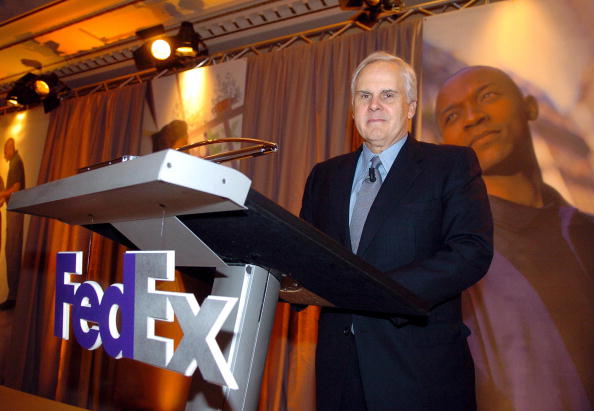Fred Smith at a Glance
Fred Smith’s Net Worth: A Deep Dive into the FedEx Founder’s Fortune
Introduction: The Pioneer of Overnight Delivery
Fred Smith, the visionary founder of FedEx, stands as a titan in the transportation industry. With a net worth estimated at $6 billion, his financial success mirrors the global impact of his company. This article delves into the life, career, and enduring legacy of Fred Smith, exploring the key factors that contributed to his wealth and influence. From humble beginnings to global dominance, Smith’s journey is a testament to innovation, perseverance, and strategic foresight. He stepped down as CEO in June 2022, transitioning to the role of Executive Chairman, leaving a lasting imprint on the business world.
Early Life and Education: Shaping the Entrepreneur
Frederick Wallace Smith was born on August 11, 1944, in Marks, Mississippi. His upbringing played a pivotal role in shaping his future entrepreneurial spirit. His father, James Frederick “Fred” Smith, laid the foundation for a business-oriented family by establishing the Toddle House restaurant chain and the Smith Motor Coach Company, which later became the Dixie Greyhound Lines. Sadly, the elder Smith passed away when Fred was just four years old, leaving his mother and uncles to raise him. Smith overcame a childhood battle with a bone disease, which instilled in him a resilience that would serve him well throughout his life. By the age of fifteen, he had become a star football player and an amateur pilot, demonstrating early signs of leadership and ambition.
Smith’s academic journey led him to Yale University, where he wrote an economics paper that, while not initially acclaimed, would later spark the idea for his global brand, FedEx. He graduated from Yale in 1966, as a fraternity brother of future President George W. Bush. His experience in the U.S. Marine Corps from 1966 to 1969 further honed his leadership skills. He earned two Purple Hearts, a Silver Star, and a Bronze Star, demonstrating exceptional bravery and dedication. After being honorably discharged in 1969, Smith prepared to embark on his entrepreneurial journey, using his inheritance and other investments to bring his innovative vision to life.
The Birth of FedEx: From a College Paper to a Global Empire
In June 1971, Fred Smith founded Federal Express, now known as FedEx, with a $4 million inheritance (equivalent to approximately $23 million today) and $91 million in venture capital. The company’s early years were marked by significant challenges. By 1973, FedEx served 25 U.S. cities with a fleet of fourteen jets. Facing financial difficulties, Smith famously took the company’s dwindling bank account to Las Vegas, where he won enough money to pay the bills through blackjack, demonstrating his resourcefulness and commitment to his vision. This daring move highlights the high stakes he was willing to take to ensure FedEx’s survival and growth. Headquartered in Memphis, Tennessee, FedEx has since become one of the world’s largest overnight express delivery companies.
FedEx: Growth, Challenges, and Leadership Transitions
FedEx’s growth is a remarkable story of innovation and resilience. Under Smith’s leadership, the company revolutionized the transportation industry by introducing the concept of overnight delivery. Throughout its history, FedEx has faced various challenges, including economic downturns, competition, and regulatory hurdles. Despite these obstacles, the company continued to expand its services and global reach. In 2008, Smith earned a total compensation of $10.4 million, reflecting his significant contributions to FedEx’s success. In March 2022, Smith stepped down as CEO, transitioning to the role of Executive Chairman, and named Raj Subramaniam as his successor. This transition marked a new chapter for FedEx, while solidifying Smith’s enduring influence on the company he created.

STEPHANE DE SAKUTIN/AFP/Getty Images
Fred Smith’s Other Ventures and Philanthropic Efforts
Beyond his leadership at FedEx, Fred Smith has been involved in various other ventures and philanthropic endeavors. He co-owned the NFL’s Washington Redskins (now the Washington Commanders), demonstrating his interest in sports and business. He also served on the boards of notable organizations such as the Mayo Foundation and St. Jude Children’s Research Hospital, highlighting his commitment to healthcare and charitable causes. His induction into the Aviation Hall of Fame recognizes his significant contributions to the aviation and transportation industries. Though offered a position as U.S. Defense Secretary, Smith declined the offer, choosing instead to focus on his business ventures.
Personal Life and Family: Beyond the Boardroom
Fred Smith’s personal life reflects the values of family and commitment. He married his first wife, Linda Black, in 1969; the couple divorced in 1977. He later married Dianne Avis, and they have eight children together. His family life provides a glimpse into his priorities beyond his professional achievements. In 2016, one of his children, Cannon Smith, married Collins Tuohy, daughter of Sean Tuohy and Leigh Anne Tuohy, who gained fame from “The Blind Side.” His family ties further illustrate the multifaceted nature of his life.
Legal Issues and Controversies: Navigating Through Challenges
Throughout his career, Fred Smith has faced some legal issues. These challenges have included a forgery indictment and involvement in a deadly hit-and-run incident. Such issues underscore the complexities of a high-profile life. Navigating these controversies highlights the need for resilience and strategic decision-making, both on the business front and personally.
/**/
Conclusion: The Legacy of a Transportation Titan
Fred Smith’s journey from a Yale student with an innovative idea to the founder of a global logistics giant is an inspiring story. His net worth is a testament to his vision, strategic acumen, and relentless drive. His willingness to take risks, as evidenced by his blackjack venture, shows his commitment to making his dream a reality. Fred Smith’s lasting legacy is not just his financial success, but the transformation of the transportation industry. He demonstrated a profound ability to adapt and innovate. His contributions to business and his philanthropic efforts are undeniable, establishing him as a true titan in the business world, one whose impact will be felt for generations to come.

